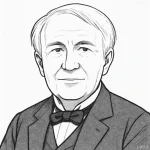“Peace is its own reward.”

- October 2, 1869 – January 30, 1948
- British Indian Empire
- Lawyer, religious leader, social activist, political leader
table of contents
Quote
“Peace is its own reward.”
Explanation
In this quote, Mahatma Gandhi encapsulates the idea that peace, both internal and external, is inherently valuable, and that its benefits are not dependent on external circumstances or outcomes. For Gandhi, peace was not simply the absence of conflict, but a state of mind, a commitment to nonviolence and truth that brought its own fulfillment. He believed that when individuals and societies strive for peace, they are not merely working to achieve something external, but are enriching their spiritual and moral lives. Gandhi’s personal and political philosophy was rooted in the belief that true peace—whether in a community, a nation, or within oneself—arises from inner harmony, ethical living, and a commitment to justice and compassion. Thus, peace itself, rather than the outcomes it might produce, is the ultimate reward for those who pursue it sincerely.
This concept remains profoundly relevant in modern society, where peace is often seen as a means to an end, rather than an end in itself. In today’s world, where many conflicts are driven by political, economic, or social motives, Gandhi’s insight reminds us that the pursuit of peace has its own intrinsic value. Rather than seeing peace as a tool for achieving other goals (such as power or wealth), Gandhi encourages us to view it as a noble pursuit in its own right. When peace is seen as a reward in and of itself, it becomes the foundation for lasting and meaningful solutions to global challenges like war, inequality, and injustice.
A contemporary example can be seen in the work of peace organizations and activists around the world who prioritize peace for its own sake, such as the United Nations Peacekeeping Forces, or activists in conflict zones like Syria or Ukraine, who work to promote peace even in the face of immense personal and societal challenges. Gandhi’s quote serves as a reminder that peace, both personally and collectively, enriches us deeply and provides satisfaction and fulfillment that cannot be achieved through other means, making it a powerful, ongoing pursuit in the face of adversity.
Would you like to share your impressions or related stories about this quote in the comments section?




